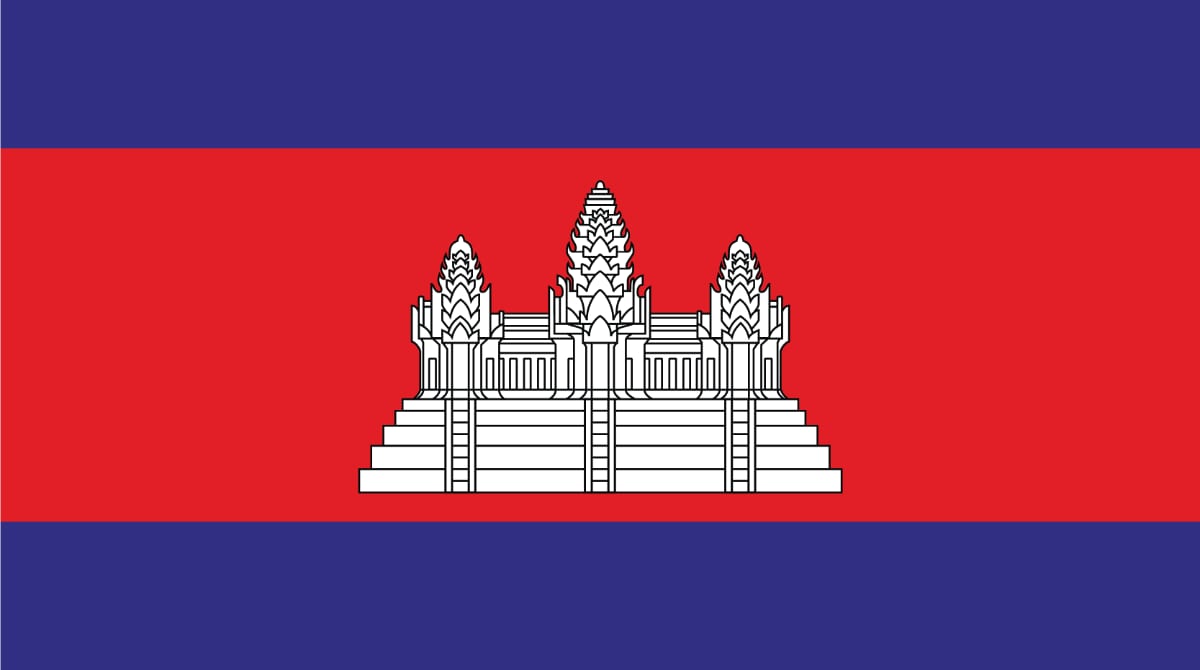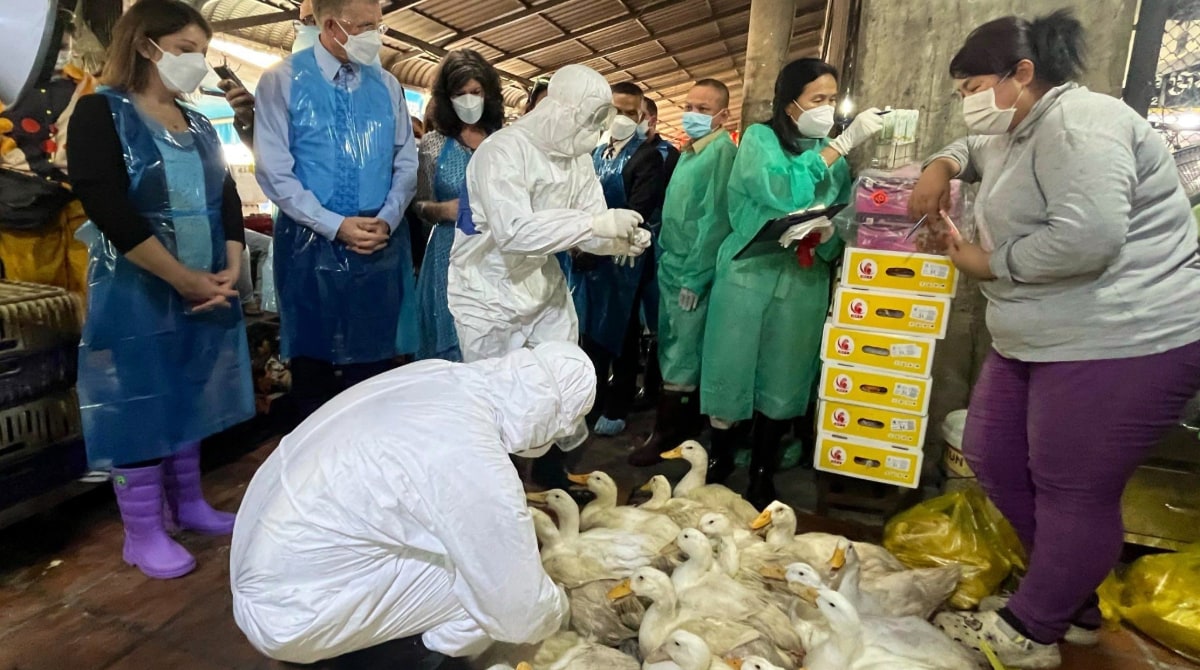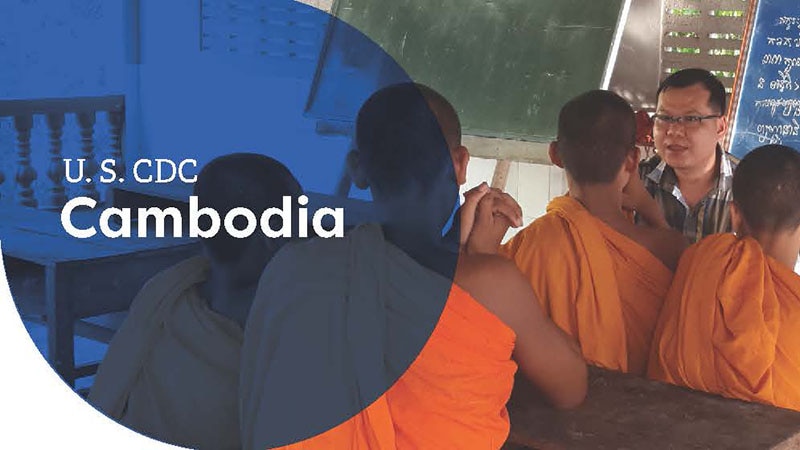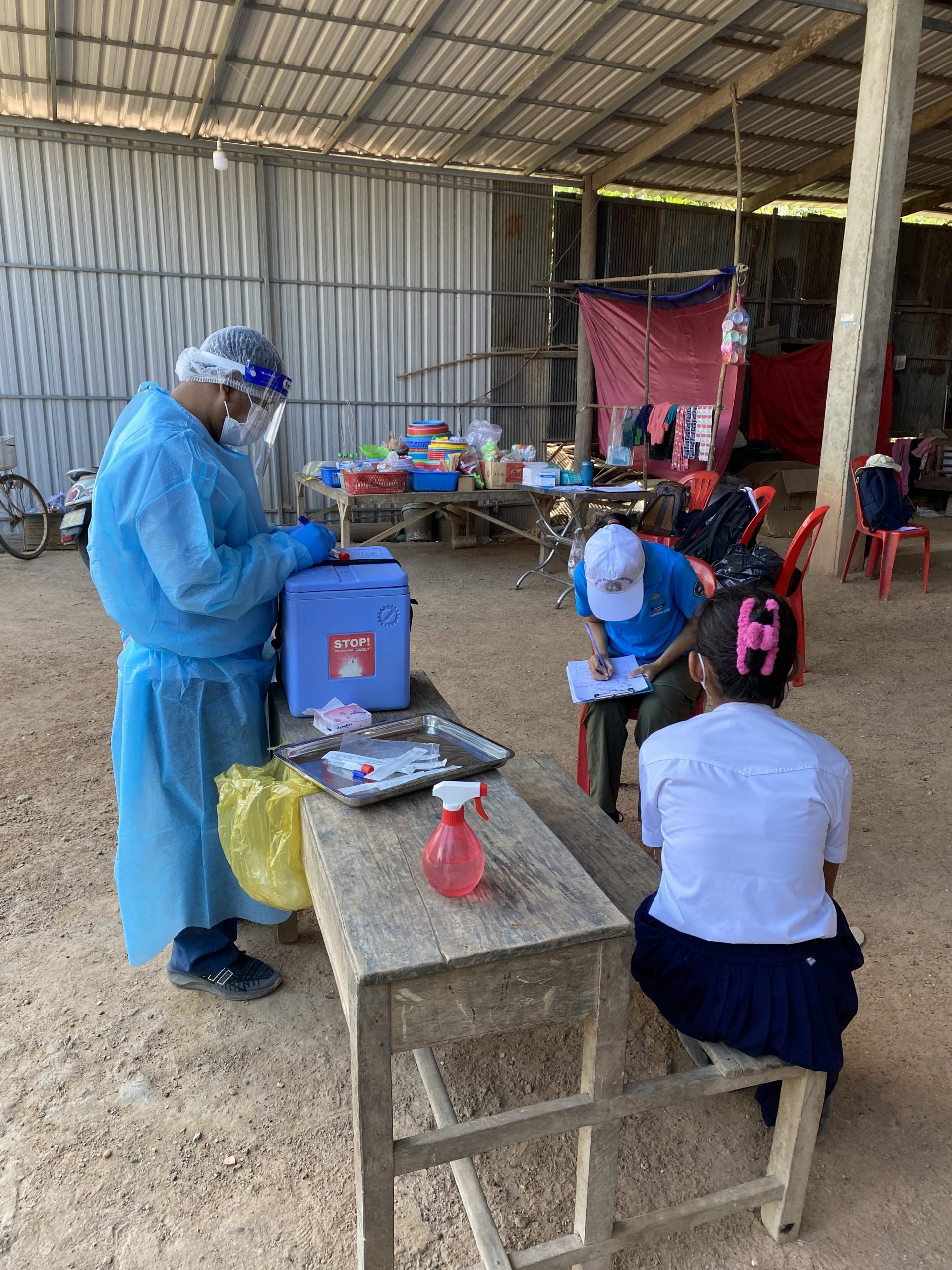At a glance
CDC Cambodia, established in 2002, collaborates with the Ministry of Health (MOH) to address HIV, tuberculosis (TB), malaria, influenza, COVID-19, and other respiratory illnesses and infectious diseases. Strategic focus includes strengthening public health laboratory, surveillance, and workforce capacities.

Overview
CDC established an office in the Kingdom of Cambodia in 2002. CDC works with the country’s MOH and local and international partners to address and strengthen capacities in:
- Global health security
- HIV
- Malaria
- Influenza
- COVID-19
- Other respiratory illnesses and infectious diseases
Global health security
Strategic focus
CDC works to strengthen the country’s ability to prevent, detect, and rapidly respond to public health threats and emergencies across the following core areas:
Surveillance systems
CDC works with partners in Cambodia to improve public health surveillance systems, collecting and using health-related information to improve programs. CDC provides technical assistance to strengthen several infectious disease surveillance systems, including sentinel surveillance for antimicrobial resistance and severe acute respiratory infection (SARI) and influenza-like illness (ILI). Patients with SARI or ILI are routinely tested for influenza, SARS-CoV-2, and respiratory syncytial virus (RSV). CDC also supports the event-based Cambodian Early Warning Surveillance System as well as surveillance for emerging and re-emerging infectious diseases such as COVID-19 and mpox.
CDC supported MOH, the Ministry of Agriculture Forestry and Fisheries (MAFF), and the Ministry of the Environment (MOE) to conduct a One Health Zoonotic Disease Prioritization Workshop in 2023. Participants reviewed evidence and agreed on five top priority zoonotic diseases: zoonotic avian influenza (bird flu), Nipah, COVID-19, Japanese encephalitis, and rabies.
Laboratory systems
CDC helps strengthen the quality of laboratory systems in Cambodia to accurately diagnose, monitor, and treat infections, including HIV, SARS-CoV-2, influenza, and other respiratory pathogens. CDC helped establish and provides support for a laboratory quality management system and an external quality assurance program. CDC is also supporting provincial HIV laboratories to achieve international accreditation.
ISO Accreditation
Workforce development
Cambodia's Field Epidemiology Training Program (FETP) was established in 2011. FETP trains public health staff at the national, provincial and district level in field-based epidemiology to detect, prevent, and control diseases to help prevent and rapidly mitigate infectious disease outbreaks. CDC Cambodia supports the frontline (basic 3-month course) and intermediate (9-month course) tiers of FETP. The intermediate program was launched in 2023, resulting in 10 graduates, and a second cohort began in February 2024. CDC provides technical assistance and mentorship for Cambodian staff attending advanced FETP training as part of regional programs in Thailand and Australia.
CDC strengthens laboratory leadership capacity through the Global Laboratory Leadership Program. Five staff from MOH's National Institute of Public Health (NIPH) and MAFF's National Animal Health Production Institute Laboratory began a two-year program as part of the first South East Asia regional cohort.
CDC is working closely with MOH, MAFF and MOE to strengthen One Health Rapid Response team capacity to better prepare for joint multi-sectoral responses to zoonotic outbreaks.
Key achievements
- By February 2024, 235 public health staff in Cambodia graduated from epidemiology training programs supported by CDC.
- CDC has provided hands-on technical support to the MOH’s Emergency Operations Center during the COVID-19 pandemic.
- CDC has trained rapid response team staff to respond to key priority disease outbreaks. CDC regularly provides technical assistance to develop surveillance, laboratory and clinical guidance for emerging infectious diseases such as COVID-19, avian influenza, and mpox.
HIV and TB
Strategic focus
Through the U.S. President’s Emergency Plan for AIDS Relief (PEPFAR), CDC is working with Cambodia to sustain epidemic control and end HIV as a public health threat by 2025. CDC focuses on helping the MOH:
- Find people with undiagnosed HIV and placing them on treatment
- Ensure treatment continuity and client-centered services for all, including children and adolescents
- Develop an HIV case surveillance system for:
- Monitoring treatment and viral load suppression
- Using real-time data from HIV recency testing to detect and respond to clusters
- Monitoring treatment and viral load suppression
- Improve laboratory systems to monitor HIV viral loads
- Promote early adoption and ensure nationwide implementation of international HIV policies
- Ensure people living with HIV are screened for TB and receive TB preventive treatment
Malaria
Strategic focus
Through the U.S. President’s Malaria Initiative (PMI), CDC partners with United States Agency for International Development (USAID) to support Cambodia’s National Center for Parasitology, Entomology and Malaria. This partnership works to pilot and expand malaria elimination activities in Western Cambodia. PMI supports Cambodia's Malaria Elimination Action Framework to achieve a vision of a malaria-free Cambodia by 2025.
PMI partners provide:
- Surveillance (antimalarial drug case-based)
- Vector identification
- Malaria case management
- Supply chain management
- Social and behavior change communication
Key achievements
- Cambodia has not had a single malaria death since 2017.
- Between 2022 and 2023, Cambodia experienced a 92% reduction in malaria cases from the Plasmodium falciparum (P. falciparum) parasite—the most severe form of malaria. Cambodia reported zero cases of P. falciparum malaria during the last eight weeks of 2023.
Influenza
Strategic focus
CDC works with the Cambodian government and other partners to conduct influenza sentinel surveillance and build laboratory and response capacity. The network monitors seasonal influenza and detects novel influenza viruses among persons with respiratory illness. The platform has been expanded to test for SARS-CoV-2 and RSV.
Cambodia contributes to the World Health Organization Global Influenza Surveillance and Response System and global genomic surveillance of SARS-CoV-2. CDC supports surveillance for avian influenza A in live bird markets in multiple provinces.
CDC works closely with partners to respond to sporadic human infections of pathogenic avian influenza (HPAI) A(H5N1) (bird flu) virus. Partners include MOH, MAFF, NIPH, Institut Pasteur du Cambodge, and the Wildlife Conservation Society of Cambodia.
Key achievements
- CDC supported the establishment of an influenza molecular biology laboratory at the NIPH.
- CDC supports identification and characterization of novel influenza viruses in Cambodia.
- CDC supports case investigations of sporadic human infections with HPAI A(H5N1) bird flu virus.
Success story spotlight
Enhancing Pandemic Preparedness through Outbreak Response in Cambodia

During 2023, six human cases of H5N1 avian influenza (bird flu) were detected in Cambodia. These are the first human cases identified in the country in nearly a decade. The first two cases were in a father and a daughter, raising global concern of possible person-to-person transmission.
CDC staff arrived within 24 hours to aid in a comprehensive outbreak investigation that leveraged local epidemiology, laboratory, and response capacities. Investigators quickly determined the source of infection and shared accurate information with the public. Throughout the investigation, CDC staff in Atlanta worked to support the in-country response and clarify the risk to the U.S. public.
Successful and comprehensive response was made possible by two decades of CDC engagement in the region, including supporting influenza surveillance and technical collaboration, developing strong partnerships with local governments and other partners, and maintaining a strong regional presence through Influenza Regional Hubs that readily provide outbreak support, resulting in stronger global health security overall.



